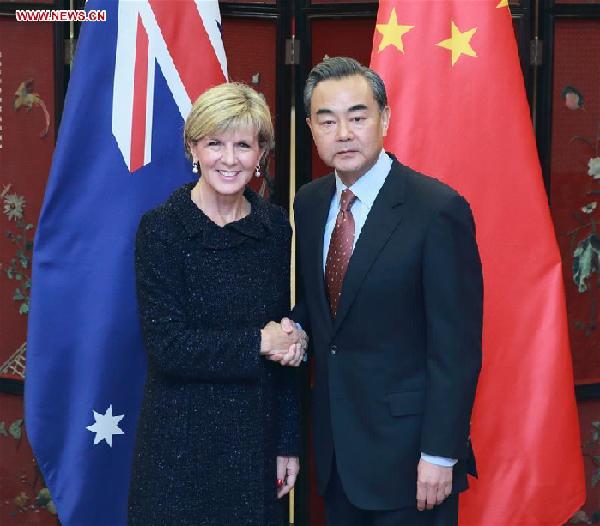Dialogue promotes China-Australia peace and strengthens ties
- By Shafei M. Hali
 0 Comment(s)
0 Comment(s) Print
Print E-mail CRI, February 23, 2016
E-mail CRI, February 23, 2016
|
|
|
Chinese Foreign Minister Wang Yi (R) shakes hands with his Australian counterpart Julie Bishop in Beijing, capital of China, Feb. 17, 2016. Wang and Bishop attended the third round of bilateral diplomatic and strategic dialogue in Beijing on Wednesday. [Photo: Xinhua/Ding Haitao] |
Recent data illustrates that Sino-Australia relations are strengthening based upon robust trade bonds. The modern Sino-Australia relations started a little over four decades ago, more precisely on 21 December 1972 and over the last forty years this relationship has grown exponentially, China is Australia's largest two-way trading partner in goods and services which can be valued at more than $160 billion annually from 2013 onwards. China accepts Australia to be an important trade partner as it is part of a handful of countries with whom China has a free-trade agreement (known as ChAFTA) which was signed in June 2015. Back in 1972 when relations commenced the two way trade between Australia and China was less than $100 million and in 2010 it stood at more than $100 billion, and people to people exchanges is also very high, the traffic of Chinese People visiting Australia plus the Aussies visiting China is more than a whopping 1,000,000 people every year and growing. With China's Belt and Road initiative gaining ground and the successful launch of the Asian Infrastructure Investment Bank of which Australia is a key member, trade relations with Australia can only grow from here onwards.
Last week Australian Foreign Minister Julie Bishop concluded a successful visit to China, during the trip a range of aspects were discussed to strengthen Sino-Australian ties. The two Foreign Ministers co-chaired the third round of bilateral diplomatic and strategic dialogue on Wednesday in Beijing.
During the third round of bilateral diplomatic and strategic dialogue Mr. Wang Yi stated that the "China-Australia relationship is facing significant opportunities," he insisted the need to "further political mutual trust, expand mutual-beneficial cooperation, respect each other's core interests and add new content to bilateral comprehensive strategic partnership."
Wang Yi proposed five avenues of strengthening trade ties. At first he called upon aligning China's Belt and Road initiative with Australia's plans to develop its northern region, and by converging China's innovation-driven development strategy and Australia's National Innovation and Science Agenda. The second called for advancing economic cooperation through trade and investments by using the platform of the China-Australia Free Trade Agreement (FTA). The third proposition aimed at expanding the people-to-people, cultural and local exchanges. The fourth proposition encompassed the deepening of cooperation in the fields of defense and law enforcement to jointly combat corruption and transnational crimes. The fifth proposition dwelled upon using international institutions like UN, G20, APEC and other multilateral occasions for deepening cooperation and coordination.







Go to Forum >>0 Comment(s)